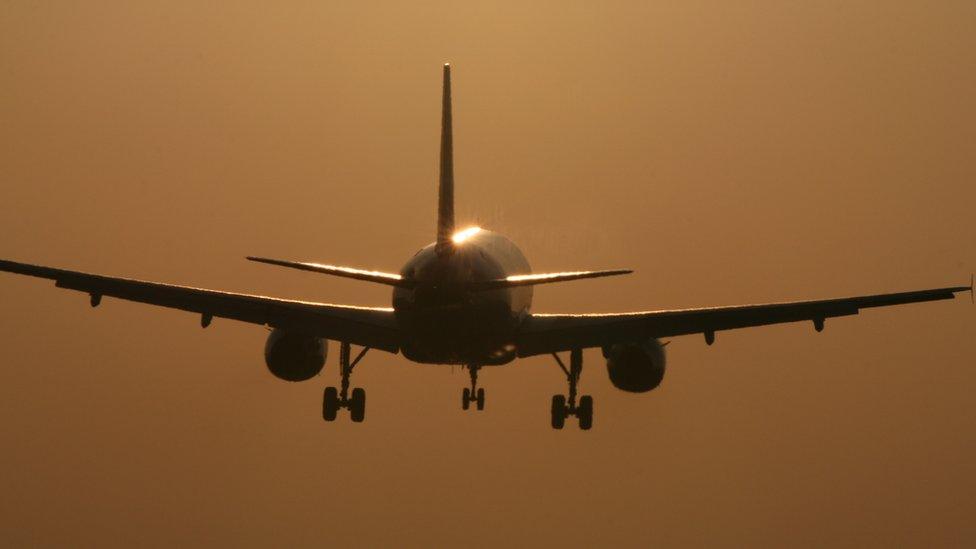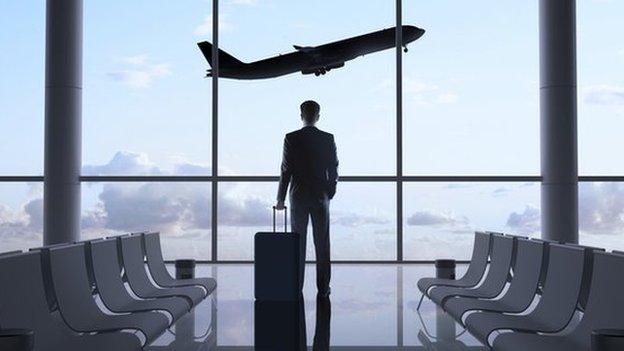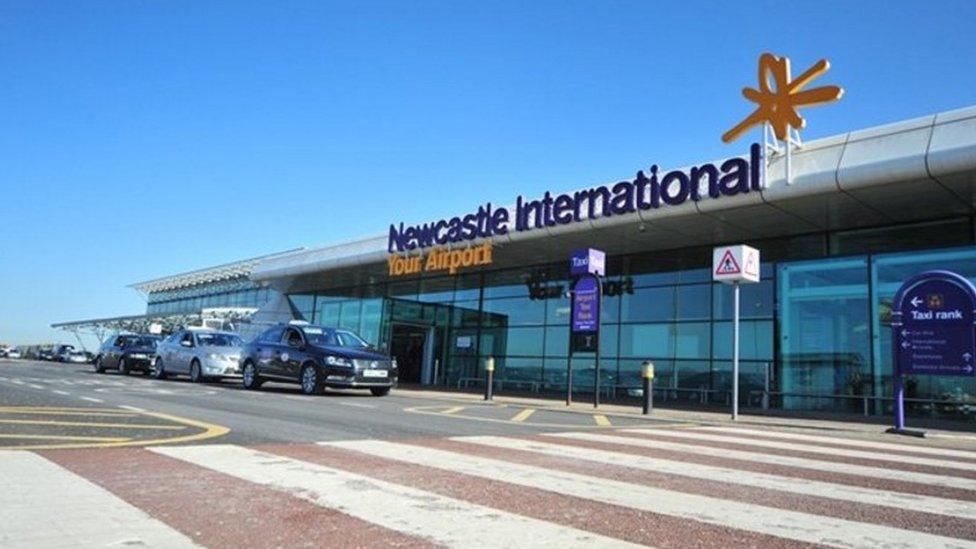Scottish air passenger duty consultation launched
- Published

The Scottish government wants to reduce APD by 50% in Scotland before eventually scrapping it altogether
A consultation on plans to halve air passenger duty (APD) on flights from Scottish airports has been launched.
Control of the tax is due to be devolved to Holyrood when the Scotland Bill becomes law.
SNP ministers have said they will cut the duty by 50% between April 2018 and 2021, if they win the Holyrood election on 5 May.
But campaigners have raised concerns about the possible environmental impact of more flights to and from Scotland.
Air passenger duty rates for currently range between £13 and £146 depending on the distance of the flight and the class of seat.
The Scottish government confirmed in its most recent Programme for Government, external that it intends to reduce APD in Scotland by 50%.
Direct flights
The reduction will begin when a Scottish replacement to APD is introduced in April 2018, and will be delivered in full by the end of the next Scottish Parliament, which is expected to be in 2021.
Ministers hope that reducing - and eventually abolishing - air passenger duty will increase the number of direct flights to and from Scotland.
The Scottish government consultation will seek views on how the reduction should be structured, and how the tax should be operated to help boost Scotland's international connectivity and economic competitiveness.
It will also ask for opinions on the environmental issues that need to be considered.

What is Air Passenger Duty?

Air passenger duty is charged on all passenger flights from UK airports
The rate of tax varies according to where the passenger is going, and the class of travel
It was introduced in 1994, and was originally just £5 per person for short-haul flights, and £10 elsewhere
The tax has been increased by successive UK governments, and brings in about £3bn a year
From 1 April of this year, flights of 2,000 miles or less will see APD charged at £13 for passengers in economy class seats, and £26 for all other classes
For flights of more than 2,000 miles, the rate will be £73 for economy class, and £146 for any other class
A higher rate - payable for aircraft weighing more than 20 tonnes but equipped to carry fewer than 19 passengers - will be charged at £78 for the lowest class of seats and £438 for all others
No APD is charged for direct long-haul flights from Northern Ireland, or for flights from airports in the Scottish Highlands and Islands
Air passenger duty for children aged over 12 and under 16 on economy flights was abolished from 1 March
It was abolished for under 12s on economy flights last year

Launching the consultation at Edinburgh Airport, Finance Secretary John Swinney said APD was one of the most expensive taxes of its kind in the world.
He added: "It continues to act as a barrier to Scotland's ability to secure new direct international routes and maintain existing ones.
"Scotland is already an attractive destination for business and inbound tourism, and it is important that we continue to open Scotland up to key and emerging markets in order to further capitalise on the opportunities that exist."
Edinburgh Airport published a report last year, external that claimed a 50% reduction in APD would create 3,800 jobs by 2020 and stimulate £200m of economic benefits for Scotland each year.
Bosses at the airport have described APD as a "regressive tax that hampers growth", and have called for the 50% cut to be introduced in one go rather than through a phased reduction.
Tourism body VisitScotland has also said there was "no doubt" that APD acts as a "major deterrent" to many potential visitors, with few other EU countries levying a similar tax.
Climate emissions
But critics have argued that new routes have been developed without the tax cut.
Scottish Labour's Jackie Baillie said the tax cut would "help the richest few whilst working class families continue to lose out".
She added: "Labour wouldn't make this SNP tax cut for the rich. Instead, we would use the money the government has set aside for the APD cut to help first time buyers save for a deposit.
"Too many young people in Scotland are stuck in a vicious cycle rather than getting on the property ladder.
"They rent to save for a deposit but the rents are so high that they can't afford to save. Under Labour's plans we would effectively double the deposit savings of those looking to buy their first home."
And Stop Climate Chaos Scotland said a cut in APD could lead to a rise in climate emissions of up to 60,000 tonnes of CO2.
'Brazen announcement'
Patrick Harvie, from the Scottish Greens, agreed with that assessment
He said: "In light of the latest climate change wake-up call, this is a pretty brazen announcement by the SNP.
"The party is trying to sell its policy with the hope that jobs will trickle down. What Scotland really needs to grow its tourism economy is investment in domestic public transport, decent broadband and a skilled workforce.
"Scottish Greens choose these priorities rather than putting more money in the pockets of a polluting industry and wealthy frequent fliers."
Also pointing out the environmental consequences was the Scottish Liberal Democrats leader Willie Rennie.
He said: "Scotland has missed its climate change targets for the last four years and any substantive cut in APD would be a giant step backwards and one Scottish Liberal Democrats cannot support."

Bosses at Newcastle Airport say they will be hit when tax reductions are applied in Scotland
Airports in England have said they would be left at a huge competitive disadvantage by an APD cut in Scotland.
Newcastle International Airport chief executive David Laws said: "We maintain the view that the government should commit now to matching reductions in Scotland across the whole country.
"If this is not possible, then our view is that the second of the options in last year's APD discussion paper - the varying of rates within England - is the most preferable and the least inequitable.
"A failure to act now would break the promise made in 2015 to protect English regional airports.
"The consequences of unmatched reductions in Scotland would be so serious that 'do nothing' continues to be simply not an option."